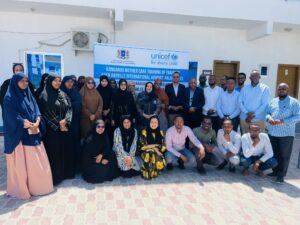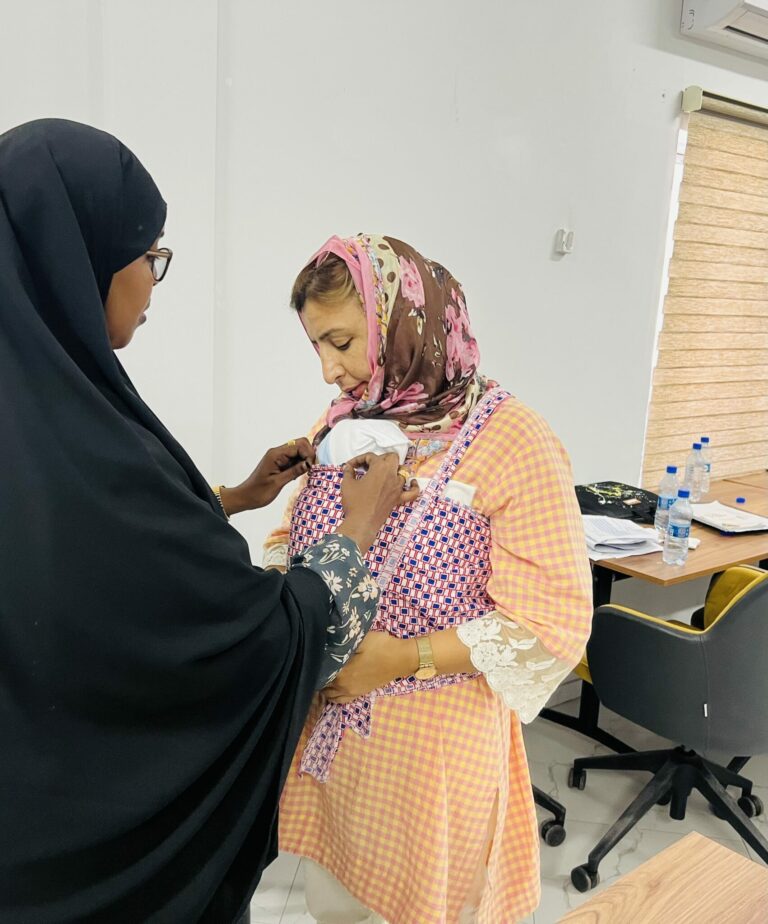A Q&A with UNICEF’s Fatima Gohar on KMC in humanitarian settings and emergencies.
Photo caption: A trainee, left, practices proper newborn placement on Fatima Gohar (right) during a recent training on Kangaroo Mother Care in Somalia.
World Prematurity Day (WPD) on 17 November raises awareness of the challenges and burden of preterm birth globally. The day was initiated by EFCNI and partnering European parent organizations in 2008. The international co-founders LittleBigSouls (Africa), March of Dimes (USA) and National Premmie Foundation (Australia) joined the celebrations and made World Prematurity Day an intercontinental movement. Meanwhile, countless individuals and organizations from more than 100 countries join forces with activities, special events and commit to action to help address preterm birth and improve the situation of preterm babies and their families.
The global theme for WPD 2023 is Small actions BIG IMPACT: immediate skin-to-skin care for every baby everywhere. This directly correlates to the work the Inter-Agency Working Group on Reproductive Health in Crises (IAWG) Maternal Newborn Health (MNH) Sub-Working Group (SWG) has been undertaking to assess and expand Kangaroo Mother Care in humanitarian settings. In order to promote this work and highlight the positive impacts KMC can have for newborns, we are featuring a discussion between the SWG co-chair, Andrea Edman, and SWG member and KMC advocate and practitioner, Fatima Gohar from UNICEF. The IAWG MNH SWG alongside Bernard van Leer Foundation and partners plan to present recent findings from a recent analysis on KMC in humanitarian settings in the next few months. If you’d like to learn more about this work and be kept informed, please email andrea.edman@rescue.org.
To hear more from Fatima Gohar, you can follow her on X (formerly Twitter) @FatimaGohar768. To learn more about the IAWG MNH SWG, visit the MNH SWG website or follow on X (formerly Twitter) @BornIntoCrisis.
Please introduce yourself.
My name is Fatima Gohar, I am working as Maternal and Newborn Health Specialist at UNICEF regional office for Eastern & Southern Africa. I am based in Nairobi.
In your opinion, why is World Prematurity Day important?
November 17th marks World Prematurity Day, a day to reinforce our commitment to support the most vulnerable population in the world – preterm babies. Every year, more than 15 million babies are born prematurely, that is, before completing 37 weeks of gestation. Preterm birth complications are the leading cause of death among children under five years of age, and 75% of these deaths could be averted with high-impact interventions. Preterm babies are at a greater risk of developing health complications and disabilities that require specialized care and support during their early years.
World Prematurity Day is an occasion to raise awareness about the challenges and difficulties associated with preterm birth worldwide. It is a day when parent organizations, hospitals, non-profit organizations, healthcare professionals, societies, companies, politicians, media, and individuals reaffirm their commitment to improving the situation of preterm babies and their families. This global initiative aims to promote education, research, and advocacy efforts to help prevent preterm births, enhance the quality of care for premature babies, and provide support and resources for families affected by preterm births.
In essence, World Prematurity Day is a crucial event that highlights the significance of supporting preterm babies and their families. It provides an opportunity for people worldwide to work together towards the common goal of improving the health and well-being of these vulnerable newborns.

In September, you participated in a KMC training of trainers in Somalia, can you tell us more about that session? For example, how did participants respond to the training? Why is it so important to do trainings like this? How is KMC in Somalia different or similar to other countries?
Kangaroo Mother Care (KMC) is a method that has proven to be very effective in reducing mortality and the risk of infection in newborns. In fact, when introduced to clinically stable hospitalized infants with a birth weight of less than 2.0kg, KMC has been shown to reduce mortality by 40%. Additionally, KMC has been found to decrease the risk of infection by 55% when compared to the use of an incubator.
The Federal Ministry of Health led a training in kangaroo mother care (KMC) in Mogadishu, Somalia from 10-14 September 2023. The training was organized by UNICEF in collaboration with the Centre for Maternal, Fetal, Newborn and Child Health Care Strategies of the University of Pretoria (UP), South Africa. The main objectives of this training were to help participants gain knowledge and skills to prepare national training of trainers (ToTs) for Somalia, manage low birth weight (LBW) babies, provide early essential newborn care (EENC), and plan for and implement KMC at scale.
The training was conducted in a hybrid model where the UP facilitators delivered remote presentations and demonstrations from a venue in Pretoria through a Microsoft Teams videoconferencing link. The presentations included PowerPoint slides and zoom-in camera activities to demonstrate certain procedures up close. Two facilitators from UNICEF were present onsite in Mogadishu to assist the participants.
The participants responded positively to the training, and we noticed a significant improvement in their knowledge and skills. Somalia has the highest rates of newborn modalities and morbidities, many of which are related to preterm births, making it an ideal candidate for KMC training. Unfortunately, KMC has not been fully implemented in Somalia. Although it may have been introduced as a project in the past, it is an intervention that is sorely needed but has yet to be embraced by the key stakeholders.
In my opinion, Kangaroo Mother Care (KMC) is equally effective in all parts of Somalia, as it remains the same irrespective of the location where it is being implemented. KMC is a highly beneficial intervention for premature babies, regardless of where they are born. Therefore, it is essential to ensure that KMC is implemented effectively, especially in a fragile setting like Somalia. I believe that interventions such as KMC play a crucial role in improving the health outcomes of premature babies, and we should strive to make it accessible to all.
In your experience, what are some particular challenges to implementing and promoting KMC in humanitarian settings?
Implementing KMC (Kangaroo Mother Care) in humanitarian settings presents several challenges:
- Resource Constraints: Humanitarian settings often lack resources, such as medical supplies, adequate facilities, and skilled healthcare professionals, which are essential for implementing KMC effectively.
- Infrastructure Limitations: Access to consistent power supply, appropriate medical equipment, and suitable facilities for providing privacy and a clean environment for mothers and infants can be limited in these settings.
- Training and Knowledge Gaps: Healthcare workers in humanitarian settings might not be adequately trained in KMC techniques, and there might be a lack of knowledge among mothers regarding the benefits and correct application of KMC.
- Cultural Barriers: Cultural beliefs and practices can influence the acceptance and adoption of KMC, requiring sensitivity and community engagement to overcome any resistance or misconceptions.
- Comfort and Functionality: As KMC is an intensive process, which traditionally relies on the mother to implement, understanding comfort and functionality factors is crucial.
- Continuity of Care: Inconsistent healthcare access and mobility of populations in humanitarian settings can hinder the continuous application of KMC, as it requires regular monitoring and support.
- Sustainability: Ensuring the long-term sustainability of KMC programs in transient or resource-constrained settings can be challenging due to funding, ongoing support, and the changing nature of humanitarian crises.
Overcoming these challenges requires a comprehensive approach that addresses resource shortages, focuses on education and training, respects cultural sensitivities, and adapts to the dynamic nature of humanitarian environments.
How can the global community better support the needs of small and vulnerable newborns born into crisis or fragile contexts?
The current evidence and understanding of Kangaroo Mother Care (KMC) and other proven interventions for small and sick newborns indicate that it is an excellent opportunity for the global community to prioritize and facilitate the implementation of these high-impact interventions in crisis or fragile settings.
It is especially important because infants in these settings have a higher risk of morbidity and mortality due to inadequate healthcare infrastructure and resources.
To ensure that these interventions are effectively implemented, it is essential that healthcare providers are trained and equipped to work in both developmental and humanitarian settings. This means that they should possess not only the necessary skills and knowledge to provide quality care but also be ready to work in resource-limited environments with limited access to medical supplies and equipment.
By prioritizing and investing in the implementation of these interventions, we can reduce the burden of morbidity and mortality among infants in crisis or fragile settings. This will not only improve the health outcomes of these infants but also contribute to the overall development and well-being of these communities.
This year’s theme of World Prematurity Day is “Small actions, BIG IMPACT”…what does this mean to you?
After twenty years of working in maternal and newborn health, I have come to realize the significance of small actions that can have lifelong impacts on a child’s life. One such intervention is skin-to-skin contact, which we seem to have overlooked or even forgotten. The main message of this text is to remind everyone that the basics matter, and we need to rectify our approach. Let us make sure that every child gets skin-to-skin contact from birth to Kangaroo Mother Care (KMC). By prioritizing these vital interventions, we can ensure healthy development and a brighter future for every child.
Is there anything else you’d like to add?
At UNICEF ESARO, we know that every woman and child deserves the best possible start in life. That’s why we work hand in hand with our sister UN agencies and partners to provide high-impact interventions such as care during labour and childbirth, essential newborn care, and sick and small newborn care, including kangaroo mother care. Our unwavering commitment is to make sure that every mother and child has access to these life-saving interventions, no matter what their circumstances may be.
